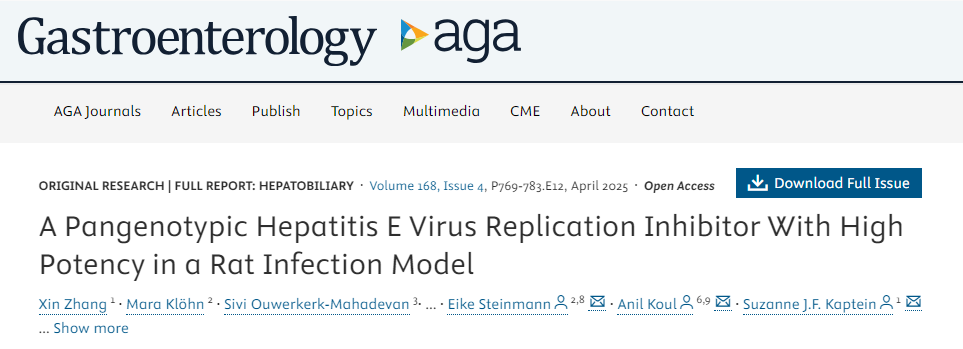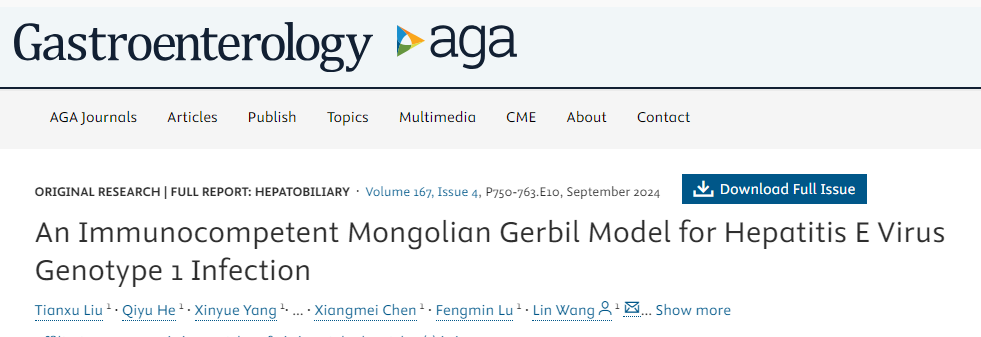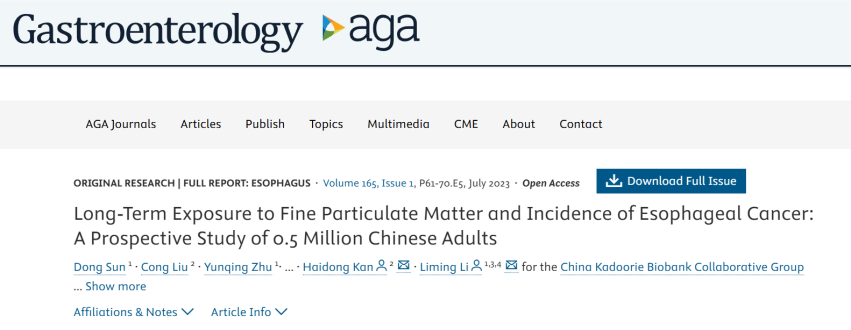查看更多
密码过期或已经不安全,请修改密码
修改密码
壹生身份认证协议书
同意
拒绝

同意
拒绝

同意
不同意并跳过





2025年3月,第二季“中国之声,创新力量——中国原创优秀临床研究展播”活动再次起航。本次活动将立足新起点,通过更立体化的传播形式、更国际化的视角,展现中国医务工作者破解临床难题的智慧与担当,助力科研成果转化。为此,我们推出“Global Perspectives, Dialogue with Editors-in-Chief”权威期刊主编对话环节,以期搭建一架中国学者与权威期刊主编的沟通桥梁。
本期为大家带来《中国医学论坛报》与《胃肠病学》主编Dr.David S. Weinberg的对话。Dr.David S. Weinberg为我们深入分析了当前胃肠病学领域的研究趋势,同时也诚恳指出中国研究投稿在选题及影响力考量上的提升空间。此外,他还对AI在胃肠病学领域的应用前景、临床研究的难点与重要性等发表了独到见解。敬请关注!
中国原创,世界回响。让我们共同期待这场跨越时空的学术对话,如何点燃临床创新的星星之火,又如何照见人类抗击消化系统疾病的共同未来。
中国原创临床研究展播第二季活动
医学期刊主编面对面
Global Perspectives,Dialogue with the Editor-in-Chief of Gastroenterology
As the Editor-in-Chief of Gastroenterology, you have a unique perspective on transformative trends in this field. What do you consider to be the most noteworthy research trends in the field of gastroenterology currently? And how will these trends impact future medical practices?
作为《胃肠病学》杂志的主编,您对该领域的发展趋势有着独特的见解。您认为当前胃肠病学领域最值得关注的研究趋势有哪些?这些趋势将如何影响未来的医学实践?

《胃肠病学》杂志主编
David S. Weinberg 博士
I think there are at least two major areas of research in gastroenterology that are moving forward quickly and will have a great impact on many patients.
我认为在胃肠病学领域至少有两个主要的研究方向正在迅速发展,并将对许多患者产生重大影响。
Ⅰ. Research on Liver Diseases
Ⅰ.肝脏疾病研究
The first is the study of metabolic-associated liver disease or MASLD (used to be called NAFLD, also known as fatty liver by some). It affects millions globally. In the West, it’ll soon be the leading cause for liver transplantation. In China, though obesity isn’t as big a health concern as in the West for now, MASLD is still important. As Chinese diets evolve and obesity levels rise, it’ll be more of a problem.
首先是代谢相关脂肪变性肝病的研究,即MASLD(以前被称为NAFLD,也被一些人称为脂肪肝)。这种疾病影响着全球数百万人。在西方国家,它即将成为肝移植的主要原因。在中国,虽然目前肥胖问题没有西方国家那么严重,但MASLD依然是一个重要的问题。随着中国饮食结构的改变和肥胖率的上升,这一问题将变得更加突出。
Much progress has been made against viral hepatitis B and C, they are still major global issues. Two significant papers by Chinese authors in Gastroenterology this year focused on a new animal model and treatment for hepatitis E, which has been cited multiple times and is likely an important contribution. So liver disease, I think, is one of the very important things.
病毒性肝炎领域同样值得关注,乙肝和丙肝防治已取得显著进展,但仍是全球的重大公共卫生挑战。值得关注的是,近两年《胃肠病学》刊登的中国学者关于戊型肝炎新型动物模型及治疗方案的论文引发学界高度关注,这项突破性研究已获多次引用。


Ⅱ. Advancements in Endoscopy
Ⅱ.内镜技术新进展
The other area are the continued advances in endoscopy. These advances can be due to AI helping identify colon polyps better or technological improvements making interventional endoscopists more capable of doing what previously required surgery.
另一个方向是内镜技术的持续突破。这些进展既包括人工智能辅助更精准地识别结肠息肉,也包括技术改进使介入内镜医生能完成过去需外科手术的复杂操作。
In my hospital with many cancer patients and bowel obstructions from cancer, when I started, most obstructions were fixed by surgery or, sometimes, stent placement via endoscopy. Now, many are fixed by endoscopically connecting two parts of the bowel to bypass the obstruction, which is a more durable advance and requires less patient recovery time.
I can give lots of examples of how endoscopy is expanding our ability to minimize patient disease and suffering that was previously only possible through surgery.
以我所在医院为例,过去治疗癌症患者肠梗阻多依赖外科手术或内镜支架置入,而现在,许多病例可通过内镜下肠道吻合术实现梗阻段旁路治疗,这一进展不仅显著提升治疗效果的持久性,更能将患者术后恢复时间缩短。类似的例子不胜枚举,内镜正不断扩展我们的能力边界,让越来越多患者避免了手术的痛苦。
I think these are two major areas, though others exist. To be honest, I don’t think this is the most impressive time for global gastroenterology research. There are advances in inflammatory bowel disease (IBD) and gastrointestinal malignancy treatment, but it seems unlikely there’ll be a huge breakthrough in treating Crohn’s disease, other types of colitis, or colon cancer in the next 5 years. I wish there were. At this point, the liver and endoscopy areas are more likely to progress faster.
坦率地讲,我认为当前全球胃肠病学研究的发展正处于相对平缓期。尽管在炎症性肠病(IBD)和胃肠恶性肿瘤治疗方面也在进步,但在未来5年内,克罗恩病、溃疡性结肠炎或结肠癌治疗出现重大突破的可能性较小。目前来看,肝病和内镜领域更有可能取得更快的进展,值得临床工作者特别关注。
How do you view the progress in research progress in gastroenterology in China in recent years? What research has made a deep impression on you?
您如何看待近年来中国胃肠病学的研究进展?哪些研究成果给您留下了深刻印象?

《胃肠病学》杂志主编
David S. Weinberg 博士
Ⅰ. Positive Aspects of Chinese Research in Gastroenterology
Ⅰ. 中国胃肠病学研究的亮点
There have been in our journal, a couple of important papers from China over the last 2 years or so that I think will have a great impact. One advantage Chinese clinical researchers potentially have is a large population to study. Those can be difficult research projects to do, but if done effectively, they’ll have a great impact.
在过去大约两年的时间里,我们的期刊上刊登了几篇来自中国的重要论文,我认为它们会产生重大影响。中国临床研究人员潜在的一大优势在于拥有庞大的研究人群。开展这类研究项目可能颇具难度,但如果能有效推进,将会带来巨大的影响力。
So the year before last, , we had a paper on the role of air pollution in various gastrointestinal diseases. The study involved 500,000 people in China. It’s an important study that would be difficult to conduct in many other places. You can argue about the specific air pollutants in China versus those in New York City, but air pollution is a problem in both places, and its impact on patients has some similarities. So, the large-scale Chinese study has generalizable value regardless of where the results are interpreted.
前年,我们发表了一篇有关空气污染在各类胃肠道疾病中所起作用的论文。这项研究涵盖了中国的50万名受试者。这是一项意义重大的研究,在很多其他地方都很难开展。或许有人会争论中国与纽约市具体空气污染物的差异,但不可否认的是,空气污染在这两个地方都是问题,而且它对患者的影响也存在一些共性。所以,无论在何处解读研究结果,中国的这项大规模研究都具有普遍适用的价值。

I’ve already mentioned the hepatitis E model. Animal models are very important for studying human diseases. What’s interesting about this hepatitis E model is that, it’s the first model of an important viral hepatitis illness that could presumably help develop better treatments.
我刚刚提到的戊型肝炎模型也很有意思。动物模型对于研究人类疾病非常重要。这个戊型肝炎模型是首个可能有助于开发更好治疗方法的严重病毒性肝炎疾病的模型。
Ⅱ. Challenges and Improvement Opportunities for Chinese Research Submissions
Ⅱ.中国研究投稿的现存挑战
I’m less impressed by the large number of papers we receive from China, which focus on generally important but not central aspects of cancer or cancer development. These papers often follow the same format. There are many laboratory-based experiments using cutting-edge techniques, but the research demonstrates more of the ability to perform laboratory techniques than to think about the problem people are trying to treat.
我们收到了大量来自中国的论文,这些论文大多聚焦于癌症或癌症发展中一些普遍重要但并非核心领域。而且这些论文往往有着相似的模式。其中有很多运用前沿技术开展的实验室实验,但这些研究更多地展现了操作实验室技术的能力,而不是对人们试图治疗的问题进行深入思考。
We receive papers from more than 100 countries with some regularity. For original research articles (I’m not referring to letters to the editor or editorials) , we accept about 9% of submissions from around the world .In fact, we truly are and would like to think that we are the leading international journal for gastroenterology in our field. There are other excellent journals such as Gut and The Lancet Gastroenterology & Hepatology, but we believe we hold the leading position.
However, we accept less than 9% of Chinese submissions to Gastroenterology. That’s because we’re less concerned about their origin and more focused on overall quality and impact. These two last factors are crucial. When rejecting a paper from China, the US, or anywhere else, sometimes its simply because it’s not well-done. But often, our reason isn’t that the paper is incorrect or could have been executed better. Instead, we reject it because we believe its potential impact on the field of gastroenterology and general health doesn’t meet our expectations.
作为全球领先的胃肠病学期刊,我们会定期收到来自100多个国家的投稿,其中原创研究论文(不包括编辑信函或社论)的接收率约为9%。然而,尽管如此,源自中国并投稿至本刊《胃肠病学》的论文占比尚未达到这一水平。出现这一情况的原因在于,我们评估稿件时并不偏重其地域来源,而更关注其整体质量和影响力,这两个因素至关重要。我们拒绝的原因不是论文错误或还有提升空间,而是因为我们认为它对推动胃肠病学领域发展和对人类健康的影响潜力不符合我们的期望。
I’m very impressed by the quality of research by Chinese investigators. Laboratory studies are done correctly, and the methodology for clinical trials is fine. Where the deficit often occurs is in the potential for impact. Sometimes,the studies are in less important areas or involve less important signaling pathways compared to papers from other investigators. I think Chinese investigators can improve in choosing what to study and how they think it will impact science in general.
当然,中国研究人员的研究质量给我留下了深刻印象。实验室研究操作规范,临床试验的方法学也没有问题,但不足之处往往是在影响力方面。与其他研究人员的论文相比,有时这些研究涉及的领域不够关键,或者所研究的信号通路重要性相对较低。我认为中国研究人员可以在选择研究课题以及思考研究对整个科学界的影响方面加以改进。
My colleague Paul Moayyedi, my co-editor-in-chief of Gastroenterology, and I are really intent on improving the journal’s ability to attract the best scientific papers from China. We hope to make at least two trips to China in 2025, meet investigators who’ve sent papers and those who haven’t, and have a useful discussion about the importance of publishing in Gastroenterology and what editors look for in a publication.
我的同事保罗·莫亚耶迪(Paul Moayyedi),也就是《胃肠病学》杂志的另一位主编,和我都非常希望提升期刊吸引中国优秀科学论文的能力。我们计划在2025年至少前往中国两次,与已经投稿和尚未投稿的研究人员会面,就《胃肠病学》期刊发表文章的重要性以及编辑对稿件的要求展开有益的讨论。
I think we can make a lot of progress on both from our side and from the Chinese investigators’side. But like many things, we need more communication about what each side can offer and how we can help each other.
我认为,无论是我们期刊方,还是中国的研究人员,都有很大的进步空间。但和很多事情一样,我们需要更多的交流,了解双方能够提供什么,以及如何相互助力。
点击阅读
②主编面对面 | 中国胃肠病学临床研究如何突破瓶颈?Gastroenterology主编David Weinberg解析难点与重要性
第二季“中国之声,创新力量——中国原创优秀临床研究展播”活动即将再次起航,敬请期待!

END
查看更多